To improve memory after 40, focus on eating brain-boosting foods like berries, leafy greens, nuts, and fatty fish rich in omega-3s. Stay well-hydrated and limit processed foods, refined sugars, and alcohol to reduce inflammation. Consider supplementing with omega-3s, vitamin D, or B-vitamins if needed, but always check with a healthcare professional first. By adopting these habits, you can support your mental agility, and you’ll find even more effective strategies to protect your brain health as you age.
Key Takeaways
- Incorporate brain-boosting foods like berries, dark leafy greens, and fatty fish rich in omega-3s.
- Use supplements such as omega-3, vitamin D, and B-vitamins to fill nutritional gaps.
- Maintain proper hydration and limit processed foods, sugars, and excessive alcohol to reduce inflammation.
- Engage in regular physical activity to support cognitive health and mental clarity.
- Adopt consistent healthy habits and nutrient-rich diets to preserve memory and mental agility after 40.

As you age past 40, maintaining a sharp memory becomes increasingly important, and the right nutrition can play a key role in supporting cognitive health. Your diet influences brain function, and choosing brain boosting foods can make a significant difference in how well your memory performs. Incorporating these foods into your daily routine helps provide essential nutrients that support neuron health, improve blood flow to the brain, and combat inflammation. Foods rich in antioxidants like berries, dark leafy greens, and nuts are especially beneficial because they protect brain cells from oxidative stress. Fatty fish such as salmon, mackerel, and sardines supply omega-3 fatty acids, which are critical for maintaining cell membrane integrity and promoting communication between neurons.
In addition to focusing on brain boosting foods, supplement strategies can enhance your cognitive health efforts. Supplements like omega-3 capsules, vitamin D, B-complex vitamins, and antioxidants such as curcumin or ginkgo biloba can serve as valuable adjuncts to a balanced diet. These supplements help fill nutritional gaps and may boost memory, concentration, and overall mental clarity. However, it’s important to consult with a healthcare professional before adding new supplements to your routine, especially if you’re on medication or have underlying health conditions. Combining a nutrient-rich diet with targeted supplement strategies can provide a holistic approach to maintaining mental agility.
You should also pay attention to hydration, as dehydration can impair cognitive function and memory. Drinking enough water throughout the day ensures your brain stays well-hydrated and functions at its best. Proper hydration is an often overlooked aspect of cognitive health, which is essential for optimal brain performance. Limiting processed foods, refined sugars, and excessive alcohol consumption further supports brain health by reducing inflammation and oxidative stress, which are linked to cognitive decline. Engaging in regular physical activity not only benefits your physical health but also enhances cognitive function, further supporting your efforts to preserve memory. Additionally, understanding types of tiny houses and how they are designed emphasizes the importance of efficient space usage and sustainable living, which can inspire you to adopt healthier, eco-friendly habits that benefit your overall well-being.
Ultimately, sustaining a diet that emphasizes brain boosting foods and using appropriate supplement strategies can help you stay mentally sharp after 40. Consistency is key—making these choices part of your daily life will have long-term benefits. Remember, your brain thrives on good nutrition just as much as your body does, so prioritize nutrient-dense foods, stay hydrated, and consider supplements wisely. Taking these steps empowers you to preserve your memory, focus, and cognitive resilience well into later years. Proper nutrition plays a crucial role in this ongoing process.
Frequently Asked Questions
Can Certain Supplements Improve Memory After 40?
You might wonder if certain supplements can boost your memory after 40. Brain boosting supplements and herbal memory enhancers are popular options that could support cognitive health. These supplements often contain ingredients like ginkgo biloba, bacopa, or omega-3 fatty acids, which may improve focus, memory, and mental clarity. However, always consult a healthcare professional before starting any new supplement regimen to guarantee safety and effectiveness tailored to your needs.
How Does Hydration Affect Cognitive Function in Older Adults?
Hydration and cognition are closely linked, especially as you age. When your fluid intake is adequate, it helps maintain your brain’s function, focus, and memory. Dehydration can lead to confusion, poor concentration, and slower thinking. So, you should prioritize fluid intake importance by drinking enough water daily. Staying well-hydrated supports ideal brain health and keeps your cognitive functions sharp, even as you get older.
Are There Specific Foods to Avoid for Better Memory?
Ever wonder if certain foods sabotage your memory? You should avoid processed foods and trans fats, as they can impair brain function and accelerate cognitive decline. These unhealthy options promote inflammation and oxidative stress, which harm your neurons. Instead, choose nutrient-rich foods like berries, nuts, and leafy greens. Isn’t it worth protecting your memory by cutting out harmful ingredients? Making smarter food choices now can boost your mental clarity long-term.
Does Intermittent Fasting Benefit Memory After 40?
Intermittent fasting can boost your memory after 40 by enhancing brain health. It encourages you to include brain boosting foods like berries, nuts, and oily fish, which support cognitive function. Additionally, combining fasting with regular cognitive exercises can improve your mental clarity and memory. You might find that this approach helps protect your brain from age-related decline and keeps your mind sharp as you age.
How Does Alcohol Consumption Impact Memory Retention?
Think of alcohol consumption like a double-edged sword. Drinking too much can accelerate alcohol-related cognitive decline, impairing your memory and brain health. Even moderate drinking effects vary; some studies suggest it might temporarily boost mood, but it can still hinder long-term memory retention. To protect your brain, limit alcohol intake, and be mindful of how it impacts your cognitive sharpness over time.
Conclusion
Remember, you are what you eat, and nourishing your brain after 40 can boost your memory and overall well-being. Stay consistent with healthy foods like berries, nuts, and leafy greens, and avoid processed snacks. Small daily choices add up over time—think of it as planting seeds for a sharper mind tomorrow. By prioritizing your nutrition, you’re investing in a brighter, more vibrant future. After all, an ounce of prevention is worth a pound of cure.









